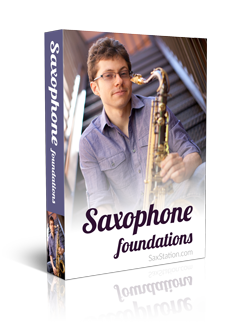Guest post on Sax Station by Randy Hunter, started talking to Randy a few years back, he’s written some good books on saxophone and can play!
___________________________________________
So, you are interested in playing jazz on your saxophone, but you’re not quite sure where to start. This can be a daunting dilemma for a developing sax player still working to cover many basic aspects of playing the instrument. In this article, I will offer some suggestions for practicing and studying that should help you develop a practical approach for learning to play jazz saxophone.
Private Instruction
Before continuing, it is necessary to mention the value in retaining the services of a private instructor that specializes in jazz. A qualified instructor can guide you along along the musical journey, validating your efforts in the practice room, while answering most of the questions that arise as you progress. In areas where a private instructor is difficult to find, online instruction in the form of podcast or webcam lessons may be a suitable and affordable alternative.
Even with private instruction, however, it is essential that you gather as much knowledge about your mission as possible. This will help you balance your goals and expectations while being certain to include all of the essential components of playing saxophone and jazz in your practice plan.
Categorize
Let’s define some categories that will help you develop a comprehensive and prioritized plan for achieving your goals. The basic categories should include listening, saxophone fundamentals, jazz reading, and jazz improvisation. There are many sub-categories that may be included at different stages of your development, but they often become self-evident as your mastery of basic jazz saxophone skills increases.
One of the most important steps you can take involves broadening your understanding of the instrument and the music by listening to the masters. Many students listen to contemporary smooth jazz sax players, but fail to get to the roots of the music by exploring the development of jazz saxophone over the generations. With today’s technology, it is easy to discover the masters through internet searches and locate their music through online radio stations like Pandora and Grooveshark.
Jazz is an expressive, personalized, and often technical music. Working to master the instrument through the fundamentals of tone production, the development of technical skills, and basic reading is crucial in honing your ability to play jazz with stylistic proficiency. These essentials may be approached through long-tone practice, scale study, and method book reading.
In addition to fundamental reading studies, it is necessary to learn to read and interpret various jazz styles. The most common jazz styles are swing, Latin, jazz-rock, and funk. There are interpretive elements unique to each of these styles that require focused study in order to achieve performance proficiency. Etudes are available that address the components of each jazz style.
For many, improvisation is the most intriguing and central aspect of playing jazz saxophone. The study of jazz improvisation begins with the practice of concepts as simple as staggering the notes in a major or blues scale and advances to include many complex rhythmic, harmonic, and technical components. A number of pre-recorded play-along series are available to assist in the practice of jazz improvisation.
Putting it Together
Learning to play jazz saxophone is a culmination of endeavors. Having insight into the essential components of learning jazz saxophone combined with the guidance of a qualified jazz instructor should help take the mystery out of how and what to practice. With this insight, you should be well prepared to develop your personal approach to learning how to play jazz on your saxophone.
Bio:
Randy Hunter is a professional saxophonist living in the north Atlanta area. He maintains a large private lesson studio and is the jazz saxophone instructor at Emory University. He is the author of the “Complete Jazz Styles” series of jazz etude, combo, and duet books. Randy also offers a series of online jazz improvisation and beginning saxophone lessons. For details, visit www.RandyHunterJazz.com.



Leave a Reply